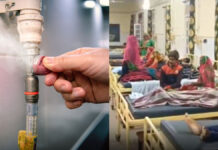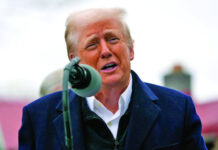India’s Gross Domestic Product (GDP) could soar by 20 per cent in the third quarter of 2020, according to predictions by Goldman Sachs which have been stated by The Economist in a detailed story on Economic Lockdowns and their implications. The GDP, which would fall in the second quarter at an annualised quarterly rate of 45 per cent, would rebound by 20 per cent in the third quarter if the coronavirus lockdowns are lifted, Goldman Sachs predicted earlier this week. The lockdowns in various countries ever since Covid-19 erupted in China and engulfed the globe, slowed down the pandemic but at the cost of economies, and India is not an exception. According to the article in The Economist, “Lockdowns can only ever be temporary. That is because it is becoming clear how costly they are, especially in poor countries. Part of the price is economic.” Absa Bank has calculated that the economy of South Africa could shrink at an annualised rate of 23.5 per cent in the second quarter, The Economist reported. In sub-Saharan Africa, an individual in the lowest income group has only a 4 per cent chance of receiving social assistance from the government in normal times. A combination of Covid-19 and lockdowns could put up to 420 million people into absolute poverty, which is defined as having to live on less than USD 1.90 a day. This would increase the total by two-thirds and set back the progress against poverty by a decade, the report said. The newspaper also explains the far-reaching consequences of having longer lockdowns that not only brings the economies to a grinding halt but also cost lives if people do not have access to essential services. The World Health Organisation has warned that the coronavirus pandemic threatens vaccination programmes. If such initiatives are stopped in Africa, 140 children could lose their lives for each Covid death averted. A three-month lockdown, coupled with a ten-month interruption of TB treatment, may lead to 1.4 million deaths in 2020 to 2025. This sums up the fact — longer the lockdowns continue, the likelier it is that they will cost more lives than they save, according to The Economist. For instance, in the United States, the country’s unemployment rate increased from 3.5 per cent to 14.7 per cent in April. In the United Kingdom, a third of new graduates had a job offer withdrawn or delayed. “Bond markets in America are signalling a wave of defaults, especially in hospitality, raw materials, carmaking and utilities. The scarring in the labour market could last for years,” said the report. A study stated that holding up cancer consultations by six months in England would offset 40 per cent of the life-years gained from treating an equivalent number of Covid-19 patients. Lifting lockdowns risks a second wave of Covid-19 infections. In April, Iran reopened to revive its economy, but last week, the country’s capital, Tehran, and eight provinces were declared “red zones”. Some US states such as Georgia, that never suppressed the initial outbreak will soon find whether they lifted lockdowns too hastily. Some African countries are going ahead even though cases are on the rise. Earlier this week, India, which has been under lockdown since March 25, gave relaxations in the restrictions, in a bid to reopen the economy, although cases have crossed the one-lakh mark. An epidemiological approach is required to limit this risk focussing on places and people most likely to spread the virus. In Canada, for example, care homes have accounted for 80 per cent of the country’s deaths, although they house only 1 per cent of the population. Refugees in Sweden are at high-risk, perhaps because several generations may be packed into households. “For this approach to succeed at scale, you need data from tests to provide a fine-grained picture of how the disease spreads. Testing let Germany rapidly spot that it had a problem in its slaughterhouses, where the virus persists longer than expected on cold surfaces. Likewise, South Korea identified a super-spreader in Seoul’s gay bars. Without testing, a country is blind,” The Economist report said.

Dogra Herald is the media of J & K, breaking language and geographical barriers, connecting J & K to the rest of India.
0191 245 4946
info@dograherald.com
Latest articles
IGP Kashmir interacts with probationary IPS officers
iamjkstarr - 0
SRINAGAR: Inspector-General of Police, Kashmir Zone Vijay Kumar accompanied by DIG CKR and other senior officers interacted with probationary IPS officers in...
Patiala Heart Institute & Multispeciality Hospital highlights importance of ‘Heart Team Approach’
DOGRA HERALD BUREAUPatiala, Sept 27Patiala Heart Institute & Multispeciality Hospital, a leading hospital for cardiovascular care in Punjab on Friday emphasized the...
Chenab to have world’s tallest rail bridge by 2021: Konkan Railways
iamjkstarr - 0
Konkan Railway Corporation Limited (KRCL) has stated that the much awaited world's tallest rail bridge linking Udhampur-Srinagar-Baramulla rail link project on River Chenab in...


























